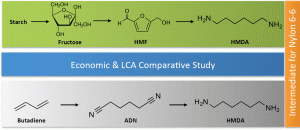 A new study comparing life cycle assessments has shown that changing from a fossil derived feedstock to biomass is not necessarily beneficial to the environment. A reliance on food crops and inefficient conversion into chemical products will cause impact the environmental and result in an expensive product, also limiting its commercial opportunities.
A new study comparing life cycle assessments has shown that changing from a fossil derived feedstock to biomass is not necessarily beneficial to the environment. A reliance on food crops and inefficient conversion into chemical products will cause impact the environmental and result in an expensive product, also limiting its commercial opportunities.
Taking the example of hexamethylenediamine, the precursor to nylon-66, scientists based at Solvay in China have shown that the benefit of adopting a renewable feedstock (starch, in this instance) is counteracted by eutrophication concerns and greenhouse gas emissions. The issue largely stems from the cultivation of the biomass and the energy required to process the starch into chemical intermediates. The renewable route requires several high energy transformations to remove the original functionality of the biomass and obtain the conventional nylon monomer.
One lesson to be taken from this study is to give greater consideration to novel bio-based polymers that can be produced advantageously from bio-based feedstocks. Ideally, these would include wastes and agricultural by-products, thus making use of the reactive chemical groups inherent to the biomass rather than removing them.
A. B. Dros et al., Green Chem., 2015, advanced article. DOI: 10.1039/C5GC01549A










